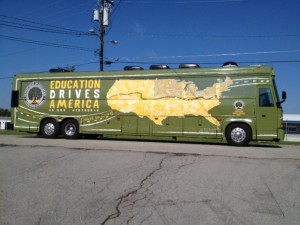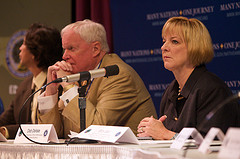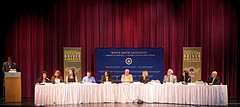A Native American Rural High School Teacher is Named this Year’s Monsanto Fund Rural Teacher of the Year
Awarded by the National Rural Education Association.Shaun Martin, 31, draws on his Native American heritage to inspire motivation and commitment from his students. He has taught and coached for eight years at Chinle High
School in Chinle, Ariz., which enrolls about 925 students on a Navajo reservation. It was the first time rural Arizona education leaders had nominated a Native American teacher for competition.
Bill Blong, executive director of the Arizona Rural Schools Association, wrote in his nomination letter that the selection committee was impressed with the young teacher who works to be a good influence and dynamic mentor.
“Mr. Martin uses the ancient practice of distance running as a catalyst to teach self-discipline, commitment, and fortitude to impart the Navajo Way to his students,” he wrote. “He uses running as a positive activity and its discipline as a way to overcome the hardships of reservation life.”
Martin grew up running alongside his father, who was raised in a traditional Navajo family. They’d wake at 5 a.m. and run to the East to meet the sun. His father told him, “Running in the morning to meet the sun and holy people is how we celebrate life, it’s how we pray, and it’s a mentor to teach us about life.”
Martin knew he wanted to be a coach and teacher by middle school, and he never wavered from that goal. He was recruited to run at Northern Arizona University and accepted an academic scholarship from the Navajo Nation. He was among only a handful of Native American athletes in the NCAA Division 1 athletic program.
He graduated from college in 2004 and took the teaching position in Chinle on the reservation. He said in his competition application that he strives to teach students the most valuable lesson he’s learned: turning negative situations into positive ones.
He implemented a distance running program at Chinle High and at the district’s other six schools. For students in grades 2 through 12, Martin uses the club to link distance-running skills to success in the classroom and in life.
His cross-country and track teams have won 13 state titles, and 14 runners have been individual state champions. But he said his most significant accomplishment is that 44 of his students have gone to college on athletic or academic scholarships. Many students in his community don’t go to college.
Martin said in his application for the award that many of his school’s students face significant challenges, such as homes without running water or electricity, traveling as far as 45 miles one way to get to school, drug and alcohol abuse, and single-parent families. He said he tries to teach them to “only focus on the variables you can control, don’t stress the uncontrollable.”
The Rural Teacher of the Year award receives a $2,000 honorarium, and the school district receives $1,000 for instructional materials and school supplies. Martin presented at the National Rural Education Association convention and research symposium on Oct. 13 in Cincinnati, Ohio.




